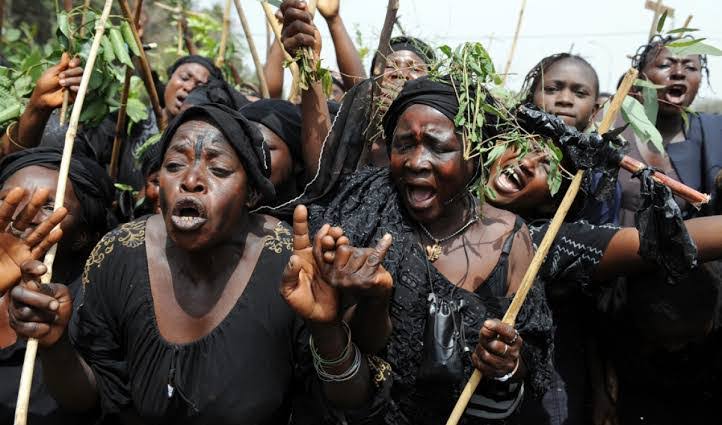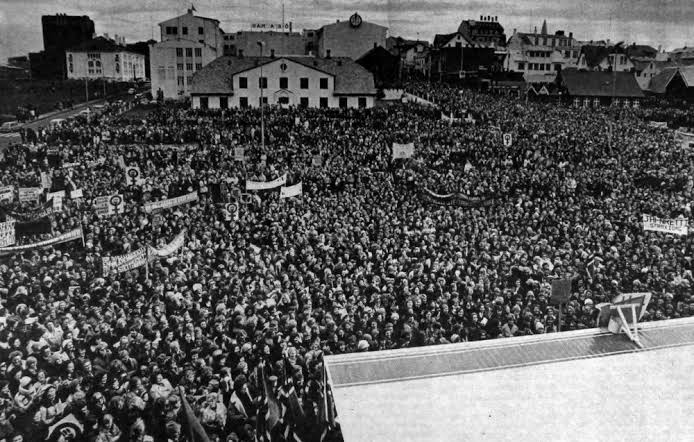
A meeting of women was called and Nwanyeruwa's excited story was told as confirmation of the rumor. Palm-leaf in some traditional African society symbolize trouble and a call for help, this was sent round to all the women of the neighborhood.
From the whole countryside women poured into Oloko and proceeded according to custom to "sit" upon the man who bad tried to assess Nwanyeruwa. All night they danced round his house singing a song which was quickly invented to meet the situation. Growing hourly more excited, they went on to Okugo's compound where his own people tried to defend him with sticks and bird arrows. The crowd mobbed him, and demanded his cap of office, which he threw to them and it met the same fate as a fox's carcass thrown to a pack of hounds. The women continued to camp in thousands round the District Office until Okugo was tried and sentenced to two years' imprisonment for assault. But this was not the end.
In spite of all the assurances of chiefs and administrative officers, to believe that women, "the trees which bear fruit," were not to be taxed, and this even after a deputation of fifty had taken train to provincial headquarters at Port Harcourt to question the Resident. 5 From Oloko women went out in all directions, beyond the boundaries of the province and even into the neighboring lbibio country, spreading the rumor, and from a wide area subscriptions began to come in to Nwanyeruwa who had become a figure of womanhood rising up against oppression.
During the second week of December, the movement spread from the Igbo divisions of Owerri and Aba, to the Ibibio peoples of Calabar. At much the same time as the elaborate form of reassessment, which the women connected with female taxation, was being undertaken in Oloko, the Resident of Calabar had issued instructions for a similar kind of enumeration in his province. This was zealously enacted in one district by a cadet in the administrative service. In some villages, the people cleared into the bush at his approach, taking their small stock and chickens with them; here, however, he counted the houses, there being generally one to each woman, and the tethering pegs for the goats and sheep. These animals, we may notice, were often the personal possessions of the women.
In the neighboring district the chiefs protested vigorously against these house-to-house visitations, though they professed themselves ready to parade all the men of each village in the central square. Another cadet, in Opobo district, to the south, met with determined opposition from the chiefs as well as from the people who were already in touch with the women at Owerri. The women followed him about wailing and cursing; palm branches, doubtless reinforced with magic, were tied across paths and doorways, while on one occasion it was grimly pointed out to him that he was actually standing on a grave where a white man like himself was buried.
Finally, he was assaulted and his tax register taken. At the neighboring center of Ukam, he and two senior colleagues were powerless to check the women, on this occasion accompanied by men, who opened the lock-up, destroyed the Native Court, and cut the telegraph wires. At Utu-Etim-Ekpo appeared crowds of women scantily dressed in sackcloth, their faces smeared with charcoal, sticks wreathed with young palms in their hands, while their heads were bound with young ferns. It is interesting to note that no Europeans understood the exact significance of these last symbols though nearly all the native witnesses assumed that they meant war. They burned the Native Court and sacked the factory (European store) and clerks' houses. They declared that the district officer was born of a woman, and as they were women they were going to see him. Police and troops were sent, and as, on two occasions, the woman ran toward them with frenzied shouts, fire was opened with a Lewis gun as well as with rifles, and eighteen women were killed and many were injured
The following day an even more serious collision occurred at Opobo. Mobs of women passed shouting and singing about the town, "What is the smell? Death is the smell." They beat upon the iron-trading stores with their sticks and threatened the traders. To one, Mr. Butler a merchant, they shouted derisively, "All right, Bottle, no fear morning time five o'clock we go come for you," and the next day, "We'll get our Christmas clothes out of you today."
In order to calm their excited fears, the district officer agreed to meet the seven leaders at the district office the following day. Palm-leaves were sent around to all the neighboring clans, and when the time came not seven but several hundred arrived at the office, armed with stout cudgels and dressed only in loin-cloths and palm-leaves. In front of the district office was a light bamboo fence, beyond that the road and, almost immediately beyond that, the river. The district officer, with a military officer and a platoon of troops, parleyed with the women from inside the fence. The leaders asked him to make notes of the discussion and then asked to see his notes.
All this time the meeting was becoming rowdier. More and more women were streaming up, until the numbers were estimated as being about fifteen hundred. When the copies were handed out, various other demands were made, such as that they must be put into envelopes, that they must have two-shilling stamps attached. They made threatening and obscene gestures toward the troops, called them sons of pigs, and said they knew the soldiers would not fire at them. At last they struck at the district officer with their sticks. The lieutenant caught the blows, made signs to the district officer as to whether he should fire (for it was impossible to make himself heard in the uproar) and, just as the fence began to give way before the rush of women, shot the leader through the head with his revolver. Two volleys were then fired on the crowd which broke and fled, leaving thirty-two dead and dying, and many and more than two dozens wounded.
This shooting was on December 17. Trouble continued sporadically in various parts of the disturbed area, but by the twentieth the situation was completely under government control , and the rest of the month was taken up with pacification by means of patrols, and punishments under the Collective Punishments Ordinance. The disturbed area covered about six thousand square miles and contained about two million people. Attacks were made upon Native Courts in sixteen Native Administration centers, and most of them were broken up or burned.
It is an encouraging feature of this unhappy incident that the authorities in Nigeria-England, should have been so ready to face the fact that it resulted largely from defects in their government. The Aba Women Rebellion point a moral that is applicable far beyond Nigeria. The difficulties in this region were exceptionally great. But beneath the peculiar local symptoms lies a pathological condition common to the whole of Africa. It is produced by the sudden strain thrown upon native communities by the strong, all-embracing pressure of European influence. There are examples in various parts of the world of native peoples unexpectedly rebelling after years of apparent acquiescence in European rule, and their conscious purposes often draw strength from what is at bottom an unconscious cultural protest. The reaction may not be expressed in this form; Some tribes endure the stress of change so quietly that their rulers do not observe their difficulties. One relief for the desire for reassertion is found in the formation of secret societies or of quasi-Christian bodies independent of white control, whose proceedings express at once European influence and an anti-European attitude. The Watch Tower movement in Southern Africa, with its apocalyptic hopes of the fall of Christendom is another good example.
The effect of the Aba women’s riot prompted the British administration to drop their plans to impose tax on women, it also helped to curb the excesses of the power drunk warrant chiefs. In addition, the positions of women in society were greatly improved as women were appointed to serve as chief warrant in some areas.

Source of copypasta
Copying/Pasting content (full or partial texts, video links, etc.) with adding very little original content is frowned upon by the community. Repeated copy/paste posts could be considered spam.
Spam is discouraged by the community and may result in the account being Blacklisted.
If you believe this comment is in error, please contact us in #appeals in Discord.